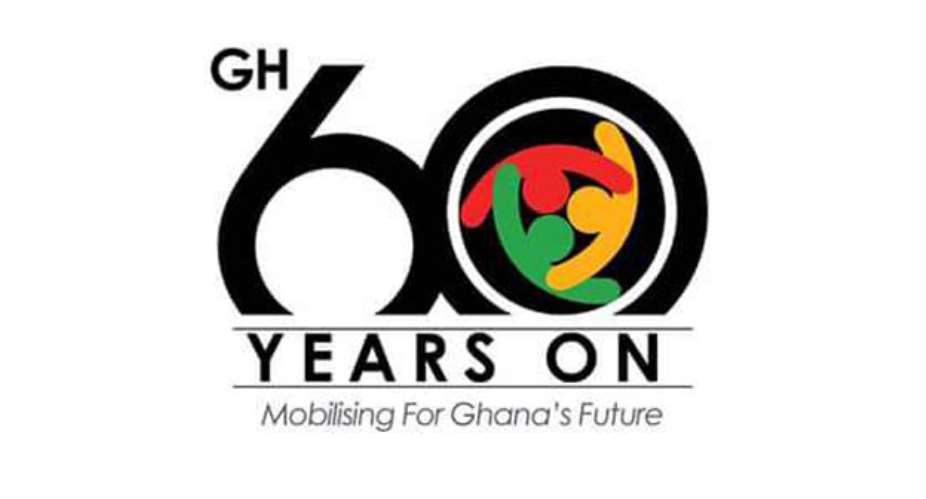Sixty years into nationhood is no mean feat. Ghanaians have cause therefore to celebrate this 60th milestone. Their heritage was won for them through the toils of their forebears, a fact poetically captured in the national anthem.
A few days ago, 28th February 1948 was marked with a parade of the surviving veterans of WWII. It was a date in our history which provided the necessary fillip to our nationalists then on the early stages of the struggle for Self Government.
That and others thereafter came together to earn us the independence we are enjoying today.
We could not have been here today without the toils of our forebears.
Every country celebrates such important spots in their histories. When the Union Jack was lowered on the midnight of 5th March 1957 the expectations were too high, the people of the newly independent Ghana expecting an overnight transformation of their lives.
After all the nationalists, their kith and kin, had painted a picture of milk and honey, one they were not enjoying under the colonialists who they added were only exploiting their natural resources and shipping them away as they lived in abject poverty.
Those who opted for a gradual approach to self-government had reasons for their position, as did those who wanted it immediately.
Two perspectives are available for those seeking to do a comparative analysis of post-independence Ghana. While one school of thought, those in favour of an immediate attainment of independence think so much has been achieved and bear no regrets for the efforts of Nkrumah; those who opted for the gradual approach think otherwise.
The former will point at the infrastructural development of the post independence era, the educational facilities created under the Educational Trust module and the compulsory free education for children alongside the construction of an additional harbour at Tema and the floating of a national carrier and a shipping line, among others.
Of what substantial benefit will it be to a people when in the face of so-called development their human rights are wantonly trampled upon through a deliberate and sustained project by the executive?
Even as we relish the activities and fanfare which accompany such great dates in the calendar of a country, we ask that we ponder over the human rights challenges which accompanied our post independence journey.
Some might argue that subversion charges were leveled against victims of the flagrant abuse of human rights but this can be countered by the point that the rule of law was no longer applicable and so charges were mere window dressing.
When a Chief Justice could be dismissed by the Executive by a stroke of the pen, the country could not have been said to be faring well in terms of good governance and human rights management.
We do not dispute the fact that attempts were made to topple the government of the late Kwame Nkrumah but what stopped the President from allowing the rule of law to be the last resort in such matters, some of which bordered on mere paranoia?
Be it as it may, so much water has passed under the bridge since those heady days of post independence political restiveness.
A country which went through multitude of attempted and military interventionists by persons seeing themselves as messiahs cannot be regarded as one which did not suffer from the varied shortcomings of humankind.
Constitutionalism has come to stay and we are gradually perfecting the electoral system. Military interventionism has long been confined to the dustbin of history.
Sixty years is a long period in the life of both human beings and nations.
Be it as it may, we cannot avoid smiling and patting each other on the back for coming this far.
Even we as we brood over the fact that we could have done better with our lives in the sixty years of our nationhood, let us not forget what we have achieved so far; nonetheless.





 MASLOC former boss sentenced to 10 years in prison with hard labour
MASLOC former boss sentenced to 10 years in prison with hard labour
 Convert National Cathedral site to tourist centre — Spio-Garbrah to govt
Convert National Cathedral site to tourist centre — Spio-Garbrah to govt
 2024 election: Don’t be scared; we're ready to maintain law and order – Dampare ...
2024 election: Don’t be scared; we're ready to maintain law and order – Dampare ...
 NDC to officially outdoor Prof Jane Naana as 2024 running mate on April 24
NDC to officially outdoor Prof Jane Naana as 2024 running mate on April 24
 ECG board members slapped GHS5.8 million fine by PURC for failing to alert publi...
ECG board members slapped GHS5.8 million fine by PURC for failing to alert publi...
 I never left NPP, they 'sacked' me for attending Alan's programme; even a $100mi...
I never left NPP, they 'sacked' me for attending Alan's programme; even a $100mi...
 Fuel prices go up today
Fuel prices go up today
 Anti-gay bill: Your stance serves no purpose; either you actively advocate for t...
Anti-gay bill: Your stance serves no purpose; either you actively advocate for t...
 Tension brews as NPP Seattle clashes with national leadership over parallel chap...
Tension brews as NPP Seattle clashes with national leadership over parallel chap...
 Anti-gay bill: You've done nothing in Ghana to prove you're against LGBTQ+; ther...
Anti-gay bill: You've done nothing in Ghana to prove you're against LGBTQ+; ther...
